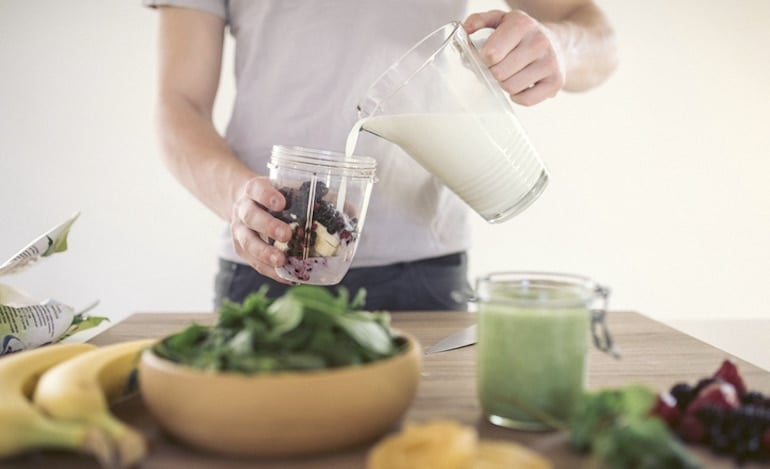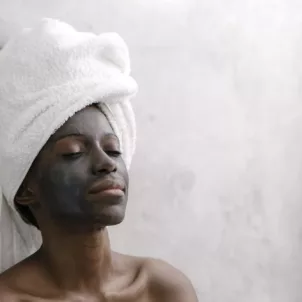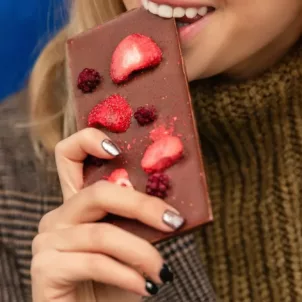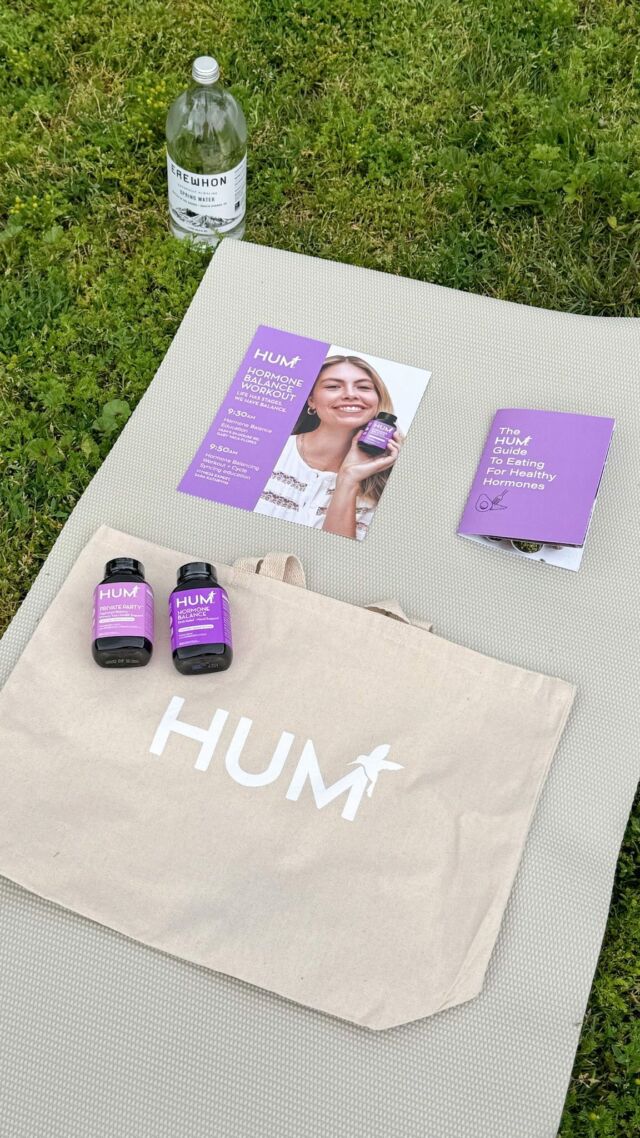Jessica Bippen, MS, RD, shares the top five foods to avoid for clear skin.
You can spend your paycheck on expensive facials, use every serum, and jade roll all you want. However, your topical skincare regimen will only get you so far. Remember: What you put in your body directly impacts skin health. So if you struggle with dry, dull, and/or acne-prone skin, your diet may be a major culprit.
Here’s a guide on foods to avoid for clear skin, including how they may be contributing to your breakouts.
5 Foods To Avoid For Clear Skin
If you’re committed to building the best diet for clear skin, aim to cut out or reduce your intake of the following foods.
1. Sugar and Refined Grains
Want to know the number one thing you can do to promote clear skin? Ditch the added sugar.
Refined grains also fit into this category because they break down into simple sugars in the body. Sugar in any form—from a candy bar to white bread—can trigger hormones and inflammation, both of which contribute to acne.
The science behind this process involves the hormone insulin and its relationship to insulin-like growth factor (IGF-1). When you eat sugar, your blood sugar levels spike. Your pancreas then responds by releasing insulin into your bloodstream to help reduce the amount of sugar in your blood. When insulin flows into your bloodstream, IGF-1 and androgen hormone production occurs. An excess of androgens is linked to greater sebum production, which often results in clogged pores. Thus, your chances of breaking out increase.
By reducing sugar, you can decrease the amount of oil and breakouts on your skin.
Additionally, research shows that sugar increases C-reactive protein, which is one of the best measures of inflammation in the body. For that reason, when you reduce your sugar intake, you should also be able to reduce inflammatory breakouts.
2. Dairy
Dairy products are among the top foods to avoid for healthy skin, especially if you struggle with breakouts.
Several studies show a correlation between milk intake and acne severity in teenagers. Additionally, research shows that young adults who regularly consume milk or ice cream more than three times per week are four times more likely to suffer from acne.
So how does milk cause breakouts? One theory among scientists is that milk increases insulin levels, which, like sugar, may make acne worse. Precursors to testosterone and other androgens in milk may influence IGF-1 in the skin, which as we saw above, is linked to the development of acne.
More research is still needed in this area, as not all scientists agree that a clear link exists between dairy and acne.
3. Fast Food and Unhealthy Oils
Western diets are significantly higher in omega-6 fatty acids than omega-3s, yet omega-3 fatty acids are an important component of the best diet for clear skin.
While both essential fatty acids are important for healthy skin, an overabundance of omega-6s correlates with increased levels of acne since they’re linked to the production of pro-inflammatory compounds. Also, these omega-6 fats typically come from unhealthy oils found in fast food.
However, there’s good news: Balancing your omega fatty acid ratio may help reduce acne severity.
To clear your skin through diet, first aim to swap out unhealthy cooking oils and reduce your intake of fast food.
You can also increase your intake of omega-3 rich foods, such as:
- salmon
- walnuts
- chia seeds
- flax seeds
- hemp seeds
Additionally, you can take a high-quality omega-3 supplement.
4. Coffee
In terms of what foods to avoid for acne-prone skin, your morning brew may be on your personal list. While coffee may not directly cause breakouts, you may find that cutting back on your coffee habit can benefit your complexion.
High caffeine consumption is associated with stress, which we know can wreak havoc on your skin. And while research shows that stress may also not directly cause acne, it can exacerbate existing breakouts.
While it’s generally safe to drink up to five cups of coffee per day, caffeine still may not work for your own skin, mind, or body.
Additionally, you may want to take a closer look at what you add to your daily brew. As we learned above, sugar and milk are among the top foods to avoid for clear skin. For that reason, I suggest reducing or eliminating sugar and rethinking what else you mix in your coffee.
5. Gluten
While scientific research is sparse concerning gluten and acne, links exist anecdotally at the very least.
Many people claim that they cleared their skin (and improved additional health concerns) by eliminating gluten from their diet. It’s possible that those who see improvements are sensitive or intolerant to gluten. When you limit your gluten intake, you may also eliminate certain processed foods and refined grains that are linked to acne.
Research also shows that gluten triggers the body to release a protein called zonulin. Zonulin loosens the tight junctions in the lining of the intestinal tract, which may lead to a leaky gut. Leaky gut may trigger skin issues, among other health conditions.
Final Thoughts
The foods you eat can have a direct effect on the clarity and radiance of your complexion. If you’re consistently struggling with breakouts, you may want to consider following an elimination diet to discover your personalized nutrition plan for clear skin.
As a registered dietitian, I recommend cutting out the foods to avoid for clear skin as listed above for at least two weeks. From there, you can slowly reintroduce one food back at a time over the course of two to three days. If you notice your skin breaking out or reacting otherwise, it’s a strong indicator that that food doesn’t agree with you.
Along the way, you may find that a clear complexion outweighs the momentary pleasure of snacking on less-than-healthy bites and beverages.
Finally, remember that nourishing your body is only one part of a complete regimen for clear skin. If you don’t notice desired results after eliminating these problematic foods, you may need to address other areas of your life that impact skin health. After all, stress, hormones, sleep, hygiene, gut health, and genetics all play a vital role in skin health.













